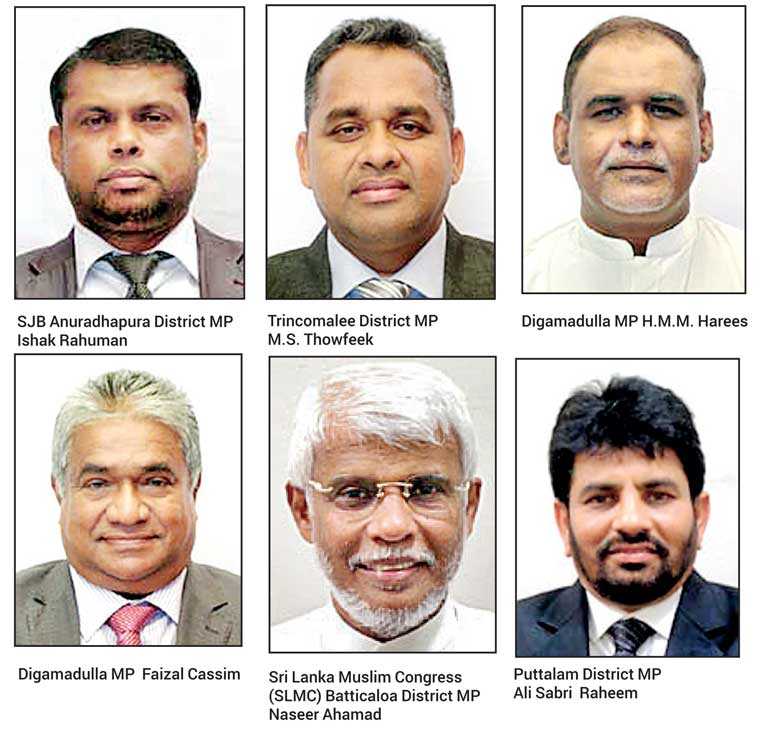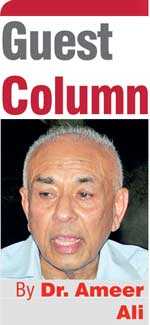Saturday Feb 14, 2026
Saturday Feb 14, 2026
Tuesday, 27 October 2020 00:52 - - {{hitsCtrl.values.hits}}

History will remember the fatal day of 22 October 2020, when a group of Muslim carpetbaggers joined the ruling gang and supported the controversial 20th Amendment, which is destined to pave the way for the slow death of democracy in Sri Lanka and establishment of a clannish autocracy.
In the future, after tasting the bitter fruits of an autocracy, generations of Sri Lankan Muslims would lament over the folly of their forefathers for choosing community leaders without any commitment to the welfare of the country and community. Do Muslims need enemies when they have such betrayers as leaders?
Of all the communities in the country, it is the Muslim community that has suffered most in recent years. With the emergence of a Sinhala-Buddhist ethno-religious supremacist movement in the aftermath of the civil war, manifesting itself in the shape of several radical political and pressure groups, this community began to face an existential threat.
After more than a millennium of peaceful co-existence and integration not only with Buddhists, but also with followers of other religions, Muslims, in the eyes of these supremacists, appeared as aliens deserved to be banished from the country.
A wave of anti-Muslim phobia with attendant violence was therefore unleashed after 2009. Neither the Sri Lanka Muslim Congress (SLMC) nor its breakaway faction All Ceylon Makkal Congress (ACMC) nor any Muslim leader from the national parties could do anything to arrest that trend and prevent the cycles of violence.
In fact, it was their powerlessness and indifference that was partly responsible for a bunch of Muslim fanatics and extremists to embark on a revenge mission that killed over 250 innocent Sinhalese and Tamil Christian worshippers on that bloody Easter Sunday, last year.
A President for Buddhists
Political analysts and observers have established that Gotabaya Rajapaksa (GR) won his presidency with the full support of the supremacists and their commercial and financial backers. Although he promised to deliver ‘prosperity and splendour’ within a ‘secure, virtuous, disciplined and lawful’ society, yet, from day one of his victory he proved to be a president for Buddhists only and not for all. He began to show a total disregard to problems faced by minorities and Muslims in particular, except to parrot that he governs for the benefit of every community.
For example, when a Buddha statue was stealthily erected at close proximity to a century old mosque in Nelundeniya, he refused to intervene and allowed the District Court to handle the matter. The Court decided to allow the statue to remain permanent with a wall built separating it from the mosque, a cause for future trouble and eventual closure of that mosque.
Similarly, when security forces guarding the prison in Mahara took over the mosque there and converted it into a recreation cum worship centre, GR refused to stop it and Muslims have lost that mosque too.
Also, when Muslims protested against cremating bodies of virus-killed bodies, he refused to intervene and supported the Chief Medical Officer, who without any scientific evidence maintained that the virus would spread if dead bodies were buried.
Finally, when Muslim private lands were encroached into by GR’s Archaeological Task Force in Pottuvil, people there had to come out to the street and threatened violence to stop losing their lands.
Lately, how humiliating was it for Muslims to watch over the media the way one of their elected representatives was brought to the Parliament a couple of days ago? Couldn’t the President have ordered a more civilised way of bringing him? Is this how the so called one-law-one-country operates?
Discrimination against Muslims
The Muslim carpetbaggers, who voted to strengthen GR’s hands and are prepared to remain just curry leaves under his autocracy cannot plead ignorance of all this.
Discrimination against Muslims in government appointments, in hospital treatment, in the private rental market, in getting land grants, in the distribution of distress allowances and so on, has become a norm and is public knowledge. Where is justice and equity in matters relating to Muslims?
One does not know what has been promised to these black sheep in return for their support. But one thing is sure: the Muslim community is bound to suffer even more in the future. Don’t these shameless leaders know that discriminatory restrictions have already been issued against building mosques, and not to places of worship of other religions?
Emerging autocracy
From ancient times and under the reign of Buddhist monarchs, Sri Lanka successfully managed and protected its plural society and prospered. After independence from colonial rule, the country earned worldwide reputation as the most senior and thriving liberal democracy in Asia. There may be flaws in that democracy as there are flaws in all democracies. Yet, there is no better political model for a plural society than liberal democracy.
To a Muslim minority in particular, there is a considerable level of “overlapping consensus” between the tenets of liberal democracy and teachings of political Islam as meticulously researched by political scientist, Andrew F. March in his ‘Islam and Liberal Democracy: The Search for an Overlapping Consensus,’ Oxford University Press, 2009.
In contrast, an autocracy with a supremacist religious and cultural agenda is a threat to the country’s plural polity and heterogeneity. Beyond that however, Muslims have an additional reason to fear about the emerging autocracy.
Economic woes
Along with moves to demolish democracy is the downward spiralling of the economy. The current wave of the pandemic is adding momentum to that spiral. Apart from difficulties that the Government is facing at the macro level, households are confronting difficulties every day at micro level.
Shortages of food and other necessities are increasing prices to unaffordable heights; panic buying is lengthening disorderly queues in front of shops; consumer debt is escalating. In short there is an acute deficiency of income syndrome (AIDS), which widens the wealth gap and is impoverishing the masses.
In times of economic adversity public discontent at the authorities is unavoidable. When that happens, authorities could always try to divert that anger on to private distributors. The ordinary shopkeeper will therefore become the first victim of consumer unrest.
The Muslim community, branded as a business community, is therefore in a vulnerable position. The supremacists and their anti-Muslim commercial backers who brought the GR-MR regime to power would be waiting to exploit such an eventuality. Will GR with his tri-forces protect the Muslims and dare risking the support of supremacists?
Comic scene in the 20A drama
In the meantime, there was another comic scene in the 20A drama. The so-called Muslim party SLMC, demonstrated its organisational chaos and party indiscipline when its members deserted their leader and moved en masse to support the motion.
Whether it was the result of a deal between the party leader and the ruling regime or a deliberate and conspiratorial revolt against that leader one does not know. However, it is time that both parties, SLMC and ACMC, are dissolved. They have become a liability to the Muslim community.
To end this short note, 20A presented a golden opportunity for Muslim leaders to show some courage and demonstrate to the Government how frustrated and dissatisfied is their community at the way it has been treated by the new regime. Whether these leaders were intimidated, bribed or cajoled, their support to this amendment is a historic blunder, which will be regretted and condemned over many years to come.
(The writer is attached to the School of Business & Governance, Murdoch University, W. Australia.)